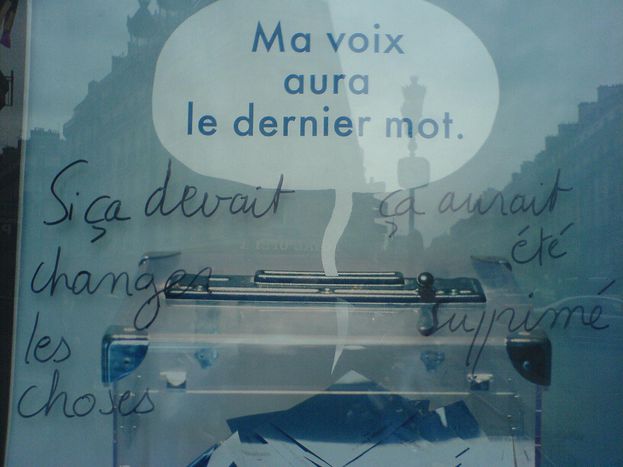
Europe in my city
Published on
As lingering in the streets of Paris, you would certainly have noticed billboards with this striking catchphrase: « Europeans, your voice will have the last word too ». If one doesn’t read carefully the content of the text, one might believe this to be a new counter-attack against the institutional referendum decided by Nicolas Sarkozy to ratify the Reformed treaty.
Nevertheless, there is the logo of the city of Paris standing next to the stars circle, and the comments referring to the municipal elections. Then, one finally understands that this does not consist in a Europhobic propaganda like what is being spread on flyers all around Paris, but in a positive campaign for Europe and for the Europeans.
For the first time, the city elections stress the “improvements” of the European legislation concerning citizenship.
You might have ignored it until now, but the Treaty of Maastricht introduced a new provision dealing with citizenship and allowing European citizens, which means anyone belonging to the European community, to take part in the election of the city where they live. Consequently, a Portuguese couple who has been living in the 14th district of Paris for seventeen years can freely register on its electoral rolls by simply showing its ID card and a housing written proof. And this will be exactly the same for the French guy living in Lisbon. By the way, we should notice that there is no minimum living period condition: until the European national can justify of his living in the city, should it has been for three months or for twenty years, it is the same right for all.
Such a promotion European citizenship seems to be a step towards enhancing the Union at the local level.
For the first time, the EU is not introduced under its ruling, constraint, impediment, etc. aspects, but what is stressed is its “territorial unity” and the equality of all when acting their citizenship, which is a common democratic ground for every State member of the EU. Some would say that it is a smart way to show Europe under its best auspices as anyone can make the experience of the European citizenship. Others, more critical, would not miss the occasion to underline that we are living in a more and more apathetic society which, even if it massively speaks out its voice during national election, remains terribly quite during local ballots, and that this ongoing situation might heavily weight on the impact of this campaign.
Nevertheless, shouldn’t we consider this initiative for what it is, a means to speak about the European Union and about what it does for its citizens?
As the EU is mostly reproached for its technocratic aspect and its lack of proximity, shouldn’t we see, here, an effort to restore the identity foundation of Europe ? The question is to be asked and should be debated. Indeed the revival of a so-called “European identity” does not consist in the voting right only. Of course, using the law to claim European citizenship indicates that a “European consciousness” is emerging. But this does not mean that Europeans are ready for a convergence of identities. Regarding all the tensions linked to communautarisms, this is still too problematic; we are more tempted to spread than to gather and the identity issue still seems to be lived as a matter of struggles and sufferings.
However, next March elections (March 9 and 16, 2008) will be the opportunity to remind to foreigners who are member of the EU and who are living in France that they also are Europeans and that, as such, they can have an impact on their daily life and speak up their voice. But it should not hide other citizens’ rights and duties like the European parliamentary elections or the possibility to consult the Comity of the Regions for any demand and/or information on Europe.
Sophie Helbert



